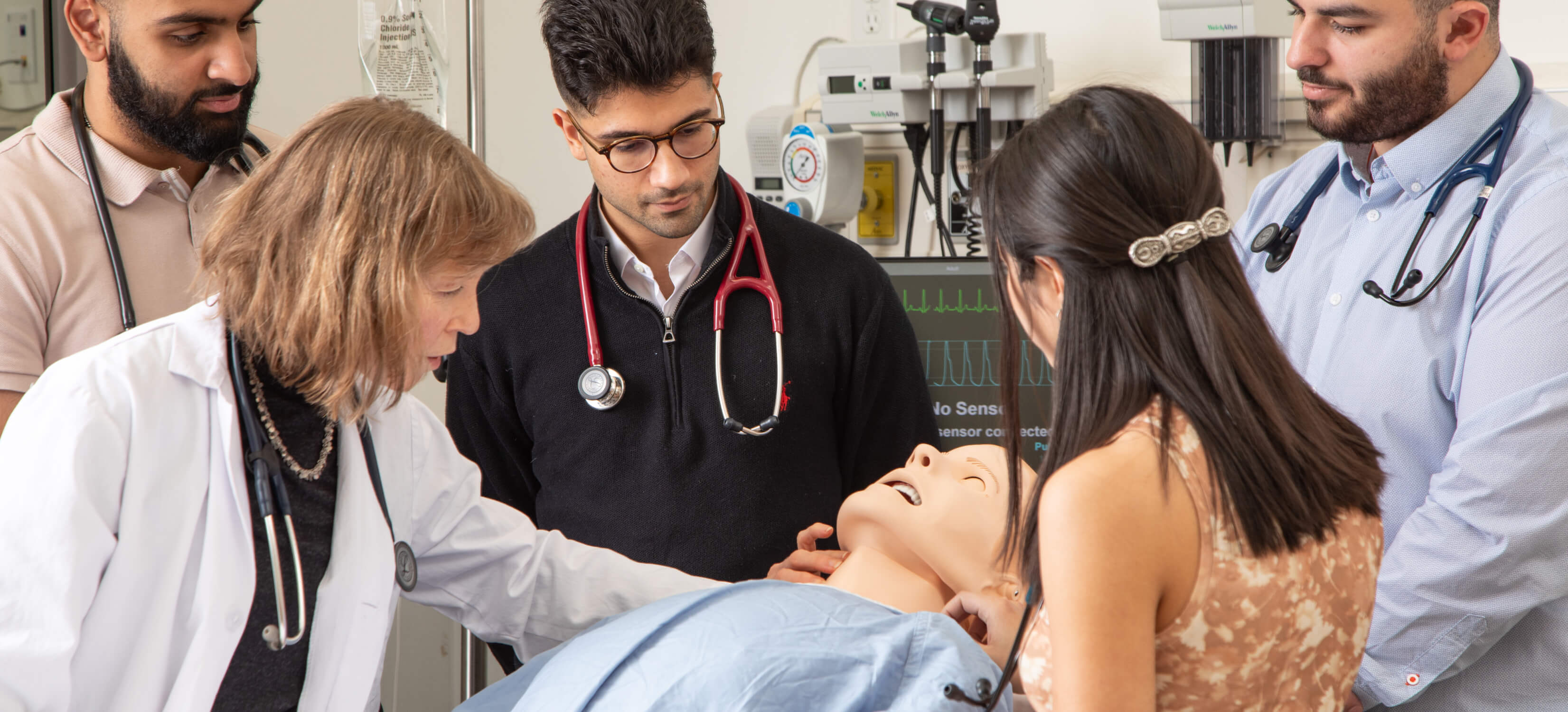About Us

With an innovative curriculum and a focus on social accountability, the MD Program at the University of Alberta prepares today's medical students to become the leaders of tomorrow.
Northern Alberta Medical Program (NAMP)
You will have the opportunity to complete the entire MD Program in northern Alberta with the Northern Alberta Medical Program (NAMP).
Governance + Administration
The MD Program is supported by a strong governance and administrative structure that is responsible for overall operations and administration.
Strategic Plan
Our medical school develops diverse, competent, and compassionate physician leaders to serve the health needs of Alberta, Northern Communities and Canada. The 2022-2027 Strategic Plan is our roadmap for the future.
Accreditation
The Committee on Accreditation of Canadian Medical Schools (CACMS) has awarded full accreditation to the FoMD’s MD program following a full site visit in October 2022.
Faculty Leaders
The MD Program includes many faculty leaders who are responsible for all aspects of the program.
Contact Us
Looking for someone in the MD Program?
Message from the Associate Dean


Whether you are a prospective or current medical student, a faculty member, or a community member who would like to get involved, I welcome you to our webpage, and hope that you will find useful information here.
With more than 700 full-time faculty and 2,200 community faculty, the University of Alberta MD program in Edmonton has been well prepared to support the learning of its 660 undergraduate medical students over a 4 year period. In partnership with Northwestern Polytechnic, we are preparing for a new distributed medical campus in Grande Prairie, with networked medical education experiences throughout Northern Alberta. When fully implemented, we will welcome an additional 30 students per year.
Our traditional four year program includes two years in "preclerkship" followed by a two year clerkship. We have a systems-based curriculum that starts with a 13 week Foundations course to help all students, regardless of their prior degree program or work experience, to have a common starting point as they then move through the body systems one at a time. These courses include endocrinology, cardiology, respirology, nephrology, gastroenterology, the reproductive system, musculoskeletal, psychiatry, and neurology. We end preclerkship with a dedicated course in oncology and a link block to prepare for the practicum that we call clerkship.
For the majority of medical students, clerkship objectives are met through sequential experiences in the major specialties of medicine including Family Medicine, Internal Medicine, Pediatrics, Surgery, Obstetrics & Gynecology, Psychiatry, Emergency Medicine and Geriatrics. During all four years, we weave in a longitudinal spiral curriculum that addresses such things as ethics, evidence-based medicine, clinical skills, interprofessionalism, and service.
It is said that we provide a nice balance of the traditional and the innovative. We are very honoured to partner with community members, including those who give of their time as "patient mentors", standardized patients, and other participants in our "human library" curriculum. Furthermore, our program emphasis on social accountability, diversity, equity, and inclusion, means that many core learning objectives can only be met through the lived expertise that is offered by these community members. All of our students are particularly well-served by the Wâpanachakos Indigenous Health Program (WIHP) and our Black Health Lead.
Our program vision, "with our communities, inspired through learning, serving society" emphasizes this important relationship between learning with community. For those who get involved, we hope that our values will be evident in the way that we conduct ourselves, including well-being, compassion, cultural safety, diverse perspectives, health equity, and growth. Our mission to develop physician leaders to "serve the health needs of Alberta, northern communities, and Canada" has been delivered over several years, but we think that we can do more. Knowing the unmet health needs, especially in the north, we are thrilled to partner with northern communities, policy makers, care practitioners, health delivery agencies and other academic institutions to create an entirely new medical education experience in the north, by the north, and for the north.
The University of Alberta has an excellent tradition of research, with opportunities for students to participate in combined degree programs (MD/PhD, MD/MSc, MD/ MBA), other formalized research (MD STIR and summer research) and a dedicated community of learning (CoRe). Other extracurricular scholarly and service opportunities are available in social justice and in the medical humanities.
As a program, our success is its people. Our motto is that "people come first", a reminder to each of us, every day, to help foster a community where the interactions amongst learners, staff, faculty, patients, families and community members are grounded in compassion, dignity, and mutual respect.
Darryl Rolfson, MD, FRCPC
Associate Dean, MD Program
Professor, Department of Medicine